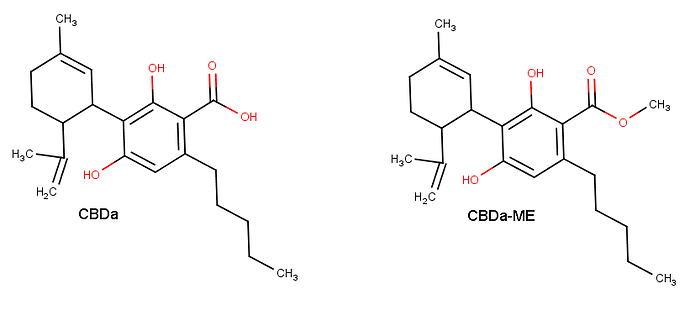From https://www.wehi.edu.au/professor-dan-peer-george-s-wise-faculty-life-sciences:
"Dan Peer is a Professor and the Director of the Laboratory of Precision NanoMedicine at Tel Aviv University (TAU). He is the Director of a national nanomedicine initiative project. He is also the Director of Leona M. and Harry B. Helmsley Nanotechnology Research Fund and the Chair of Tel Aviv University Cancer Biology Research Center; the biggest Cancer Center in Israel that includes 17 affiliated hospitals.
In contrast to the extensive knowledge on CBD, there is very limited literature on cannabidiolic acid (CBDA), also a major constituent of the Cannabis sativa plant, which may be due to its instability. It was first isolated in 1955 (Krejčí and Šantavý, 1955, Acta Univ Palacki Olomuc 6:59-66). Its structure was elucidated in 1965 by analysis of the physical properties of its methyl ester, cannabidiolic acid methyl ester (CBDA-ME) (Mechoulam and Gaoni, Tetrahedron, 1965, 21:1223-1229). Its synthesis from cannabidiol was subsequently reported (Mechoulam and Ben-Zvi, J. Chem. Soc. Commun., 1969, 7:343-344).
The cannabinoid acids are precursors of the natural cannabinoids (Potter et al., J. Forensic Sci., 2008, 53:90-94) potentially lowering the amount of drug required to induce effects.
Inflammatory bowel diseases (IBD) is a group of chronic inflammatory conditions of the gastrointestinal tract that can impact both the large and small bowel. IBD affects approximately 1.4 million Americans, and its peak onset is in persons 15 to 30 years of age. With direct correlation between IBD flare-ups and a stressful lifestyle it is no surprise that between 1975 and 2006, over 100,000 hospitalizations for IBD occurred within the Veteran healthcare system. Although its etiology remains unknown, unregulated immune system and aberrantly activated lymphocytes and monocytes are implicated in the IBD pathogenesis. As many IBD patients are refractory to conventional medical treatments, developing novel therapeutic modalities is urgent.
We tested two Inflammatory bowel disease models (an acute IBD model; DSS induced colitis) and a Chronic model (IL-10 Knockout mice) to evaluate the anti-inflammatory effect of CBDA-ME. Our results show a robust therapeutic effect of CBDa-ME over CBD and open new avenues for maintenance therapy in IBD and other potential inflammatory conditions."
CBDa has a lot of therapeutic potential, and now methyl ether CBD seems like it will become the future of CBD industry in terms of it’s potential as a pharmaceutical. This information is not super easy to locate, but CBDa-ME is very simple to make from CBDa.
Even though CBDa-ME is not an acid and technically an ester, they refer to it as stabilized CBDa because the nomenclature “methyl ester” sounds scary to the average cannabis person.
What does everyone think? I think we should start cranking this stuff out before the pharmaceutical companies do.

